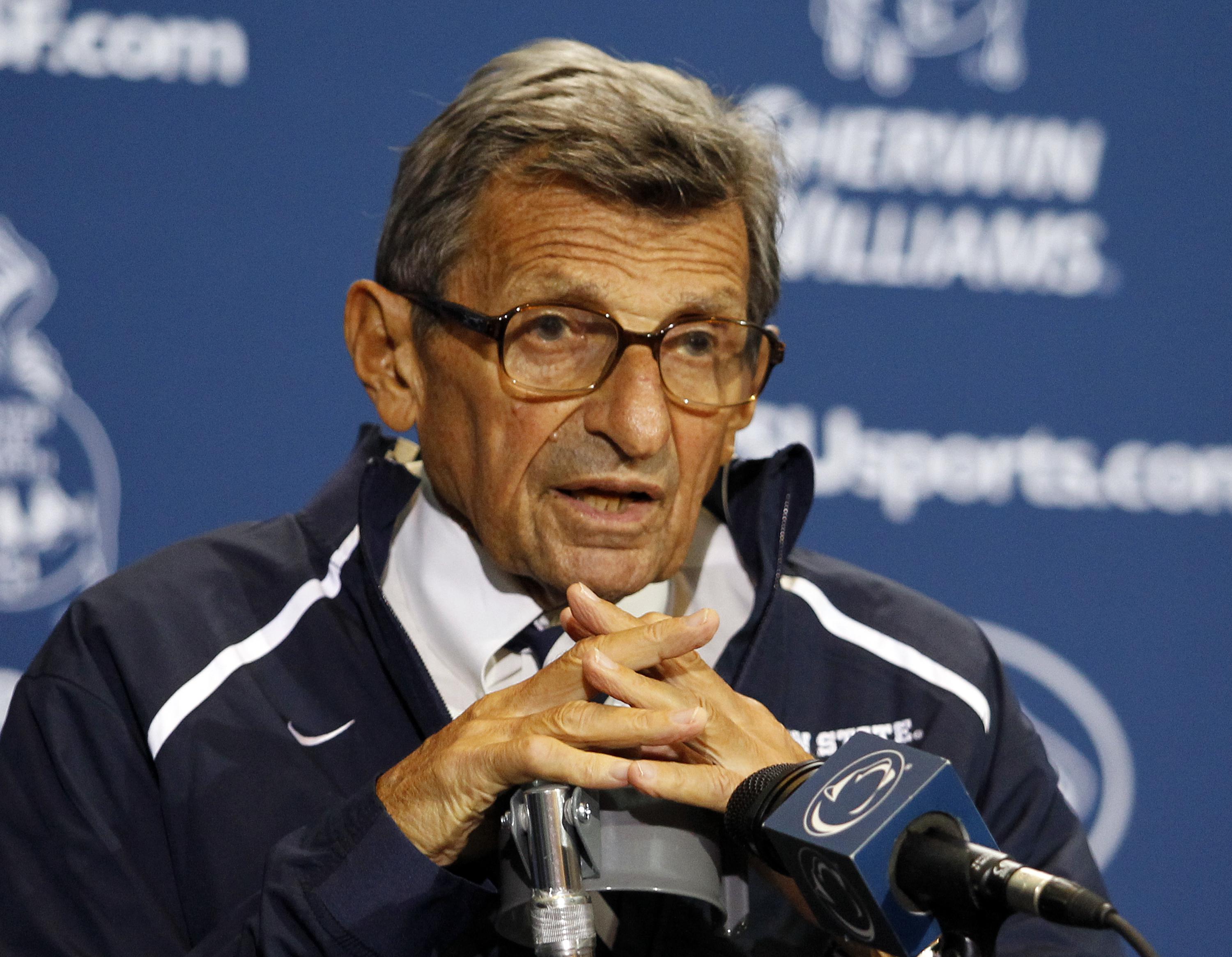Penn State football is usually the highlight of my fall. But just as my Catholic mother stopped going to mass for a time because of the church sex-abuse scandal, I don’t think I’ll be able to watch the Nittany Lions any time soon. For the first time, I’m ashamed to be a Penn State football fan.*
At a school where football comes first, the news came during a bye week: A former Penn State assistant football coach, Jerry Sandusky, was charged with sexually assaulting eight boys, and administrator Gary Schultz and athletic director Tim Curley have been accused of failing to report the allegations. Though it’s impossible to pick out the most-nauseating details in the grand jury report, school officials’ lack of interest in reporting Sandusky’s alleged crimes is particularly disturbing to this Penn State alum. Among the people who didn’t go to the police is legendary football coach Joe Paterno. In a statement released over the weekend, Paterno says that in 2002, a graduate assistant to the football team told him “that he had witnessed an incident in the shower of our locker room facility … but he at no time related to me the very specific actions contained in the Grand Jury report.”*
I graduated from Penn State in 2006. When I arrived on campus, I had no interest in any sport involving a ball and elected not to purchase season football tickets. But I quickly realized that being alone on campus with my principles on game day was not as much fun as taking part.
Moreover, I was taken in by the cult of JoePa. If football is Penn State’s religion, Paterno is somewhere between the pope and God. Paterno, who has been at Penn State since 1950 and has been the Nittany Lions’ head coach since 1966, has long been our school’s benevolent figurehead. Penn State, I learned, had one of the highest rates of graduating football players. A friend who played for the football team—a four-star Rivals.com recruit—told me that one of the reasons Penn State wanted him was his moral character. The team was among the least-penalized in the nation. When Adam Taliaferro suffered a catastrophic injury in a 2000 game, Paterno insisted that he keep his scholarship; the coach’s wife, Sue, drove regularly to Philadelphia to bring the hospitalized Taliafero cookies.
I fell hard for the myth of the team’s virtue, and for the coach who bucked the corrupt culture in big-time college sports. Paterno gave enormous amounts of money to the school to create a library; he also helped establish the school’s classics program, which, as a Latin minor, meant a great deal to me. Penn State has never been spiritually and morally perfect—star running back and domestic abuser Larry Johnson went there, after all. But there has always been a sense that Paterno cared more about his players’ futures, and the integrity of the program, than winning games. As scandals sacked USC, Ohio State, Miami, I felt smug. Penn State may not be the national powerhouse it once was. But it retained a sense of class, of choosing to do things the right way rather than the easy way.
It is that moral superiority, cultivated during my years on campus, that has left me and many other Nittany Lions loyalists devastated by these allegations. Paterno’s role is the biggest betrayal. For all of us who went to Penn State over the last few decades, Paterno served as an honorary grandfather. He might be a curmudgeon, and he might be doddering, but you always felt that he had everyone’s best interest at heart. Not anymore. Even if he may have fulfilled his legal obligations in this case, and even if it’s true that he didn’t know the extent of the allegations against Sandusky, Paterno clearly neglected his moral duty. The coach should’ve known what to do without thinking twice: When a child is potentially in danger, you absolutely must call the police.
Paterno’s poor decision, and the unconscionable actions of other Penn State administrators, left other young boys in danger. Sandusky has long led a nonprofit called The Second Mile that’s supposed to help at-risk kids. Now, we know that some of his alleged victims were children from The Second Mile program. Had Paterno or anyone else alerted law enforcement back in 2002, it seems, several of Sandusky’s alleged victims might have gone unharmed.
Nine years ago, when that Penn State graduate assistant told Joe Paterno the horrible thing he’d seen, the Penn State football team had just finished one of its worst seasons in history. A vocal core of fans were calling for Paterno to retire, but the old coach refused to quit. Could Paterno have neglected his moral duty because his job was in danger? A year ago, I would have said, “Of course not.” Now, I’m not so sure.
Correction, Nov. 8, 2011: Due to an editing error, this article originally mischaracterized what a Penn State graduate assistant reported to coach Joe Paterno about Jerry Sandusky. Though accounts differ on what Paterno was told, the grand jury report says Paterno informed Penn State athletic director Tim Curley that, according to the grad assistant, Sandusky had been “fondling or doing something of a sexual nature to a young boy.” (Return to the corrected sentence.)
Update, Nov. 7, 2011: This sentence has been revised to fix an editing error. (Return to the revised sentence.)
